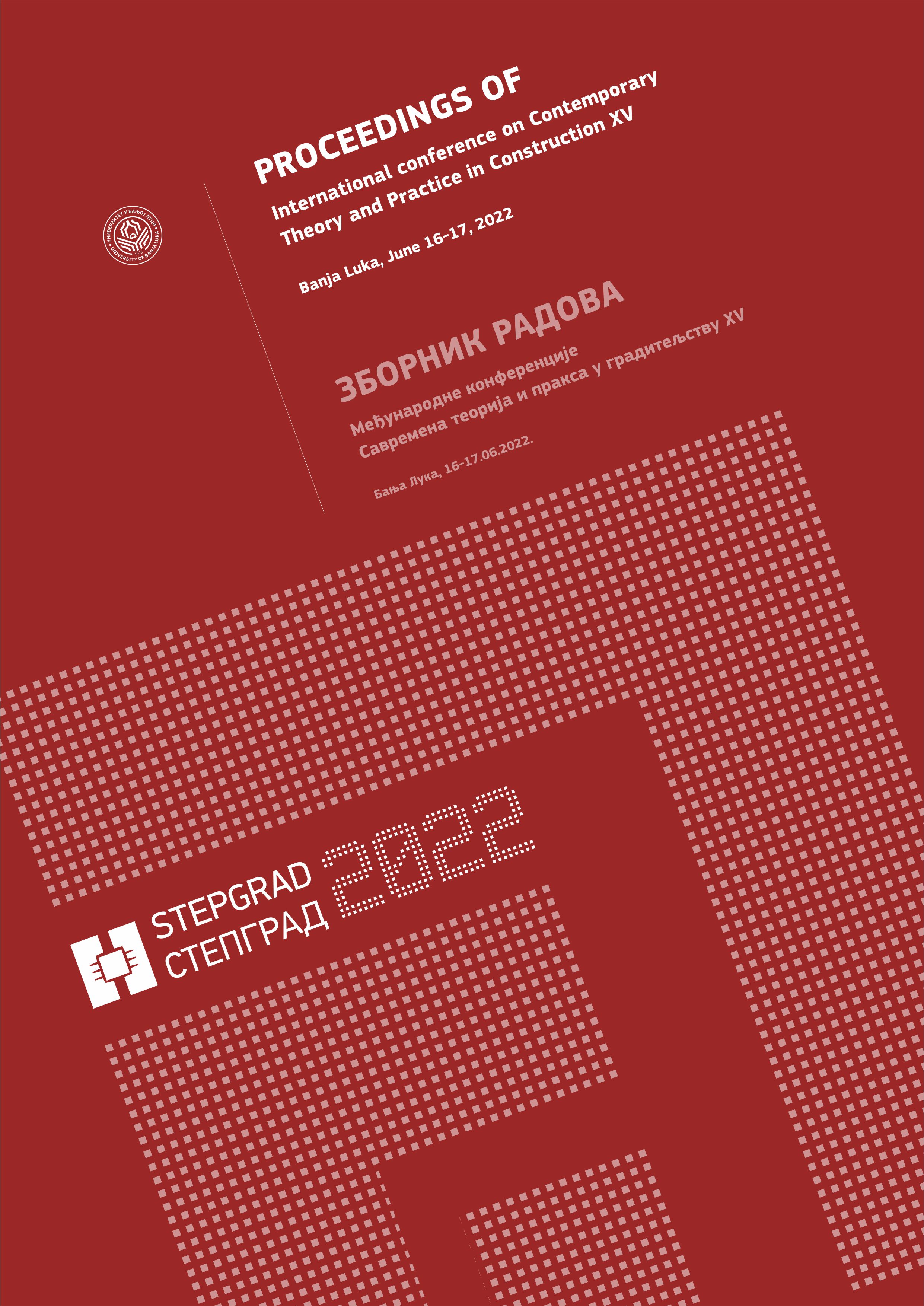COLLECTIVE HOUSING FORM IN THE CONTEXT OF THE DISPERSED CITY: BANJA LUKA CASE STUDY
DOI:
https://doi.org/10.7251/STP2215246MAbstract
The paper discusses how the dispersed urban form of Banja Luka (Bosnia and Herzegovina) is
related to the collective housing form that emerged during the 20th and 21st centuries. The
morphological study resulted in the typological patterns of collective housing form based on the
relationship between the house and open space and follows its transformation during the period. It
was based on a qualitative analysis of the figure/ground ratio and its configuration, and the
correlation of morphology results to distinct economic issues and architectural paradigms. The
research confirmed that open space was continually and significantly present in collective housing
form in all typological patterns. The diffuseness and openness on the housing scale contributed to
the dispersity of urban form on a larger scale.
References
S. E. Bibri, J. Krogstie, M. Kärrholm, “Compact city planning and development:
Emerging practices and strategies for achieving the goals of sustainability,”
Developments in the Built Environment, vol. 4, 2020,
https://doi.org/10.1016/j.dibe.2020.100021.
E. Burton, M. Jenks, K. Williams, Eds. The Compact City. A Sustainable Urban Form?.
Routledge, 1996.
R. Burgess, M. Jenks, Eds. Compact Cities. Sustainable Urban Forms for Developing
Countries. Routledge, 2000.
The Organisation for Economic Co-operation and Development, “Compact City
Policies: A Comparative Assessment”, 2012. [Online] Available:
https://www.oecd.org/regional/greening-cities-regions/compact-city.htm
N. Brenner. New Urban Spaces Urban Theory and the Scale Question. New York: Oxford
University Press, 2019.
N. Brenner, Ed. Implosions/Explosions: Towards a Study of Planetary Urbanization.
Berlin: Jovis, 2013.
M. Topalović, “Architecture of territory. Beyond the limits of the city: research and
design of urbanising territories.” Inaugural lecture presented by Milica Topalovic on
November 30, 2015 at the ETH Zurich. https://doi.org/10.3929/ethz-a-010794553.
P. Vigano, C. Arnsperger, E. Lanza, M. Martina and C. Cavalieri, “Rethinking Urban
Form: Switzerland as a “Horizontal Metropolis,” Urban Planning, vol. 2, pp. 88-99,
doi: 10.17645/up.v2i1.871.
R. van der Velde and S. de Wit, “The Landscape Form of the Metropolis,”
FOOTPRINT, vol. 5, pp. 55-80, June 2009, https://doi.org/10.7480/FOOTPRINT.3.2.709.
N. Novaković, A. Milaković, D. Simonović, “Properties and qualities of dispersed urban
fabric: understanding the Banja Luka urban form,” in International Conference on Urban
Planning Proceedings, P. Mitković, Ed., 2020, pp. 163-170.
A. Rosi, Arhitektura grada. Beograd: Građevinska knjiga, 2008, p. 53.
F. Maki, Nurturing dreams. Collected essays on architecture and the city. Cambridge:
Massachusetts London: The MIT Press, 2008.
M. A. Hermida, N. Juca-Freire and J. P. Carvallo-Ochoa, “Urban tissues and residential
types in Cuenca (Ecuador),” Urban morphology, vol. 24.1, 2020.
L. Alonso De Armiño Pérez, G. Vicente-Almazán Pérez De Petinto, VJ. Casañ Llopis, “
Housing form and city form: Urban morphology and local identity,” in 24th ISUF
International Conference. Book of Papers, 2018, pp. 779-790,
https://doi.org/10.4995/ISUF2017.2017.5772.
G. Ledent and S. Komossa, “Referential types as clues for housing design,” Urban
Morphology, vol. 23, no. 2, 2019, pp. 125-142.
B. Case Scheer, “Urban Morphology as a Research Method,” in Planning Knowledge
and Research, J.W. Sanchez, Ed., Routledge, 2018, pp. 167-181.
J. Finci, Razvoj dispozicije i funkcije u stambenoj kulturi Sarajeva. Sarajevo: Zavod za
stambenu izgradnju NR Bosne i Hercegovine, 1962.
S. Cvijić, Moderna stambena arhitektura Banjaluka 1929-1941. Beograd: Zadužbina
Andrejević, 2014.
N. Novaković, Research into patterns of use of public open spaces for the purpose of
neighbourhood regeneration: a case study of the city of Banjaluka (Doctoral dissertation).
University of Belgrade - Faculty of Architecture, 2014.
V. Stošić, Z. S. Mačkić, Banjaluka koje ima i koje nema u 1000 slika. Mega multimedija,
digitalno izdanje, 2004.
B. Scheer and D. Scheer, "Typology and Urban Design Guidelines: Preserving
the City without Dictating Design," in Nineteenth Century Urban Morphology, Aga Khan
Series, A. Petruciolli Ed., Cambridge, MA., 1998

